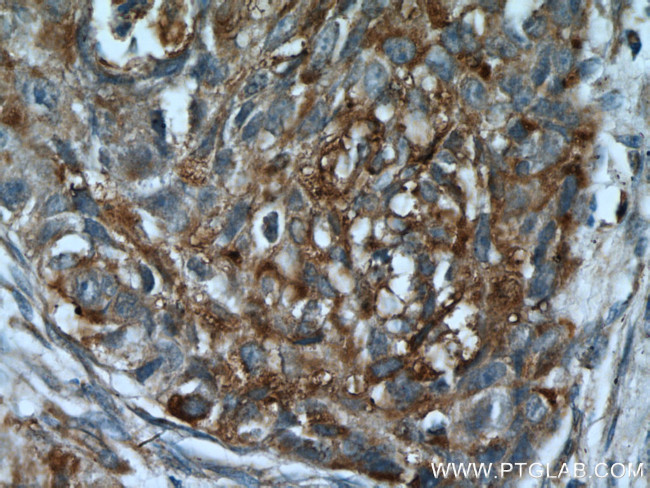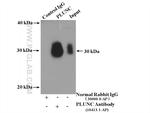Search Thermo Fisher Scientific
Product Details
10413-1-AP
Species Reactivity
Published species
Host/Isotype
Class
Type
Immunogen
Conjugate
Form
Concentration
Purification
Storage buffer
Contains
Storage conditions
Shipping conditions
Product Specific Information
Immunogen sequence: MFQTGGLIV FYGLLAQTMA QFGGLPVPLD QTLPLNVNPA LPLSPTGLAG SLTNALSNGL LSGGLLGILE NLPLLDILKP GGGTSGGLLG GLLGKVTSVI PGLNNIIDIK VTDPQLLELG LVQSPDGHRL YVTIPLGIKL QVNTPLVGAS LLRLAVKLDI TAEILAVRDK QERIHLVLGD CTHSPGSLQI SLLDGLGPLP IQGLLDSLTG ILNKVLPELV QGNVCPLVNE VLRGLDITLV HDIVNMLIHG LQFVIKV (1-256 aa encoded by BC012549)
Target Information
PLUNC is the human homolog of murine plunc and is specifically expressed in the upper airways and nasopharyngeal regions. The exact biological function of this protein is not known, however, it has been suggested to be involved in inflammatory responses to irritants in the upper airways. It may also serve as a potential molecular marker for detection of micrometastasis in non-small-cell lung cancer. This gene is the human homolog of murine plunc, and like the mouse gene, is specifically expressed in the upper airways and nasopharyngeal regions. The exact biological function of this gene is not known, however, it has been suggested to be involved in inflammatory responses to irritants in the upper airways. It may also serve as a potential molecular marker for detection of micrometastasis in non-small-cell lung cancer. Multiple transcript variants resulting from alternative splicing in the 3' UTR have been detected, but the full-length nature of only two is known.
For Research Use Only. Not for use in diagnostic procedures. Not for resale without express authorization.
Bioinformatics
Protein Aliases: BPI fold containing family A, member 1; BPI fold-containing family A member 1; ligand-binding protein RYA3; LPLUNC3; Lung-specific protein X; LUNXNASG; Nasopharyngeal carcinoma-related protein; Palate lung and nasal epithelium clone protein; palate, lung and nasal epithelium associated; palate, lung, and nasal epithelium associated; palate, lung, and nasal epithelium clone; palate, lung, and nasal epithelium expressed transcript; protein Plunc; Secretory protein in upper respiratory tracts; short palate; Short PLUNC1; SPLUNC1; SPLUNC1SPURT; tracheal epithelium enriched protein; Tracheal epithelium-enriched protein; Von Ebner protein Hl
Gene Aliases: bA49G10.5; BPIFA1; LUNX; NASG; PLUNC; SPLUNC1; SPURT; UNQ787/PRO1606
UniProt ID: (Human) Q9NP55, (Mouse) P97361
Entrez Gene ID: (Human) 51297, (Mouse) 18843

Performance Guarantee
If an Invitrogen™ antibody doesn't perform as described on our website or datasheet,we'll replace the product at no cost to you, or provide you with a credit for a future purchase.*
Learn more
We're here to help
Get expert recommendations for common problems or connect directly with an on staff expert for technical assistance related to applications, equipment and general product use.
Contact tech support






